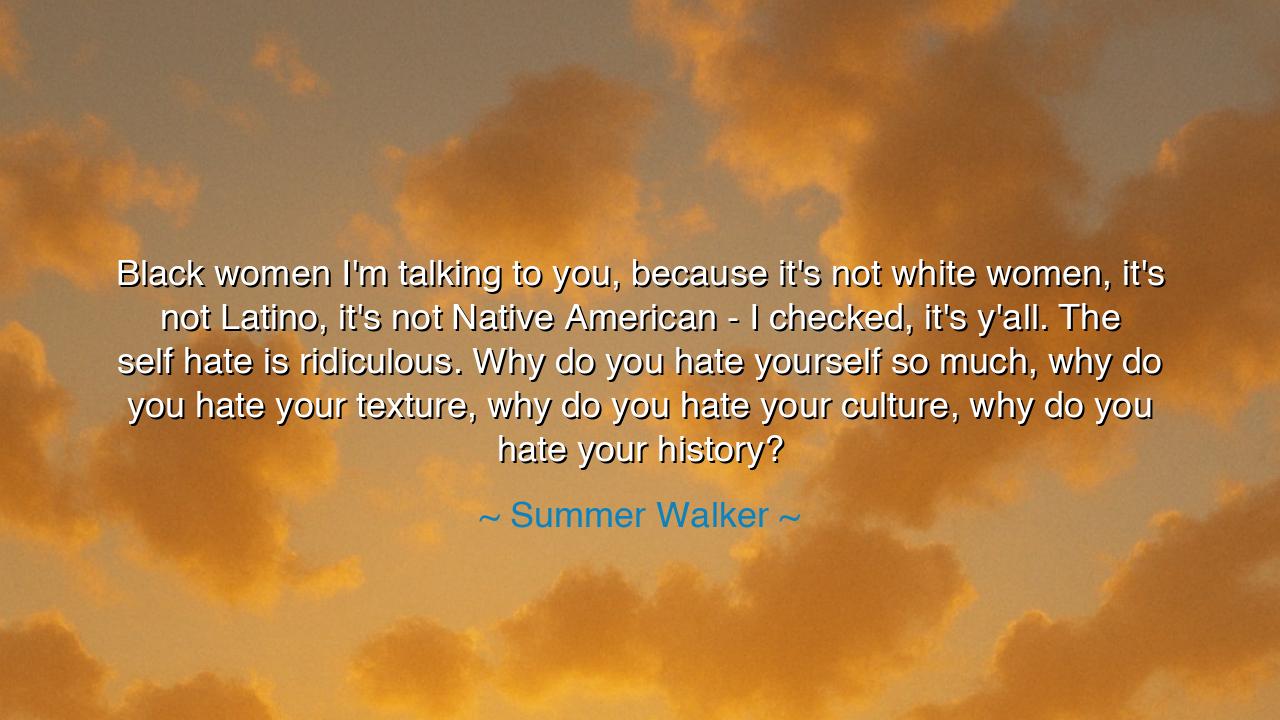
Black women I'm talking to you, because it's not white women
Black women I'm talking to you, because it's not white women, it's not Latino, it's not Native American - I checked, it's y'all. The self hate is ridiculous. Why do you hate yourself so much, why do you hate your texture, why do you hate your culture, why do you hate your history?






“Black women I’m talking to you, because it’s not white women, it’s not Latino, it’s not Native American — I checked, it’s y’all. The self hate is ridiculous. Why do you hate yourself so much, why do you hate your texture, why do you hate your culture, why do you hate your history?” — Summer Walker
Thus spoke Summer Walker, a voice both modern and ancient in its cry — a lament not of accusation, but of love and sorrow. Her words, fierce and tender, are the sound of a daughter calling to her sisters, of a woman holding up a mirror to her own people. In this cry, she speaks not merely to the individual, but to generations — to a wound carried across time, buried deep within the souls of Black women, whose beauty, strength, and identity have too often been turned against them by a world built to despise their reflection. Her voice trembles with pain, but it is also a call to awakening.
The origin of such self-hate, as Walker boldly names it, is not born in the hearts of those she addresses — it is a seed planted by oppression, nurtured by centuries of dehumanization. From the chains of slavery to the propaganda of colorism, from the forced erasure of African identity to the endless glorification of Eurocentric ideals, the image of the Black woman has been distorted and diminished. She was told that her hair was unruly, that her skin was too dark, that her features were too coarse — until the lie became so loud that it drowned out the truth. Walker’s words seek to silence that lie. She demands: Why do you hate yourself so much? — not to shame, but to shake awake the sleeping spirit of pride that lies buried beneath centuries of pain.
History bears witness to this struggle. In the early 20th century, Madam C.J. Walker, once a washerwoman, became America’s first female self-made millionaire by creating beauty products for Black women — not to make them more like others, but to help them reclaim care for themselves. She said, “I want women to see their own beauty.” Her work was not vanity; it was resistance. Every comb, every bottle, every product she made whispered: You are worthy. You are beautiful as you are. Yet even she faced critics who claimed she reinforced the very standards she sought to destroy. Such is the paradox of liberation — to reclaim what the world has twisted requires both strength and self-understanding.
When Summer Walker speaks of “hating your texture, your culture, your history,” she reveals how deep the scars run. The hatred she names is not a choice — it is the echo of centuries where everything associated with Blackness was demeaned, while its stolen forms were exalted. The rhythm of African drums, the richness of melanin, the brilliance of natural hair, the poetry of dialect and style — all were mocked, only to be later imitated by those who once despised them. In such a world, the greatest rebellion is self-love. For to love one’s Blackness, in a system that profits from its erasure, is to wage a holy war for the soul.
Yet, Walker’s tone is not only one of grief — it carries the fire of correction, the fierce love of one who refuses to watch her sisters forget who they are. Her message echoes the voices of women like Maya Angelou, who declared, “You may write me down in history with your bitter, twisted lies, but still, like dust, I’ll rise.” It recalls Nina Simone, who sang that to be young, gifted, and Black is a sacred inheritance. Through them, and through Walker’s cry, resounds the same truth: You are not broken — you have been broken by the world, and now it is time to mend.
In the tradition of the ancients, her message is both prophecy and prescription. For a people to rise, they must first remember. To remember is not to dwell in pain, but to reclaim power — to see beauty in one’s texture, pride in one’s culture, reverence in one’s history. The elders of old taught that a tree with shallow roots will wither in the storm. So too, a people who forget where they come from lose the strength to stand. Walker’s rebuke, then, is not meant to wound — it is meant to deepen the roots, to remind her sisters that they are descended from queens, scholars, artists, and warriors who shaped civilization itself.
So, O daughters of the diaspora, take this teaching into your hearts: self-love is not vanity; it is survival. Reject the mirror that reflects only what the world wants you to see. Look instead into the mirror of your ancestors — the mirror of resilience, rhythm, and radiance. Celebrate your curls as crowns, your skin as sunlight, your voice as the echo of ages. For every time you choose to love what history taught you to despise, you strike a blow against the very chains that bound your foremothers.
And when you rise — as surely you will — remember the voice of Summer Walker, who dared to speak this truth aloud: that the war against self-hate is the most sacred battle of all. To win it is to be reborn — not as something new, but as what you have always been: magnificent, powerful, and free.






AAdministratorAdministrator
Welcome, honored guests. Please leave a comment, we will respond soon